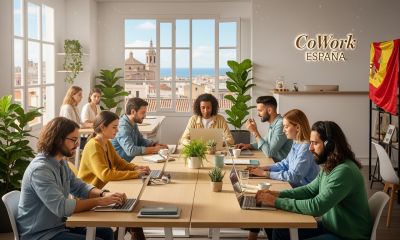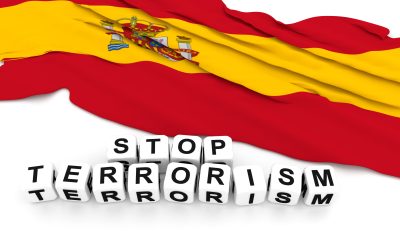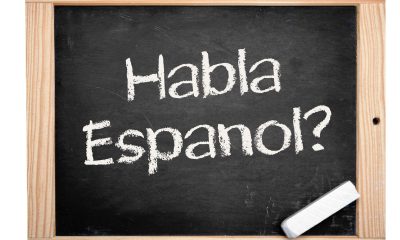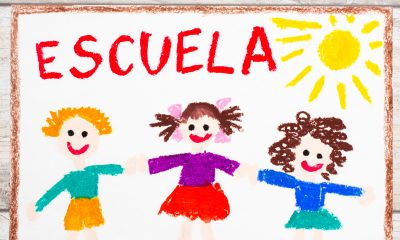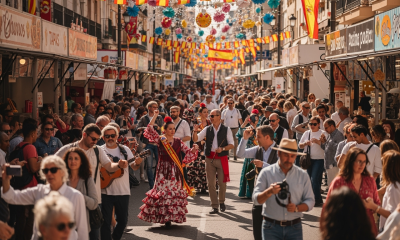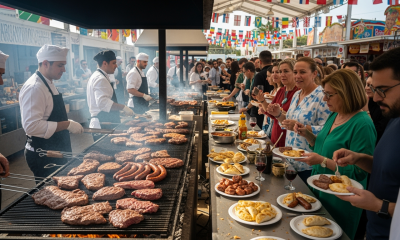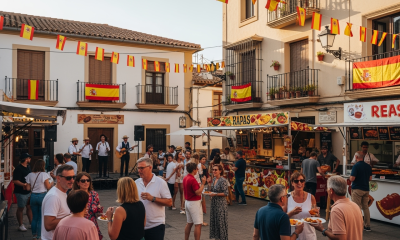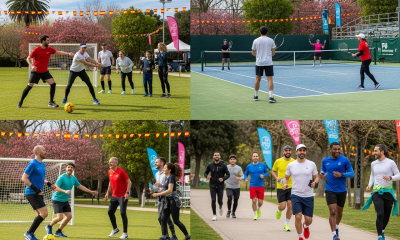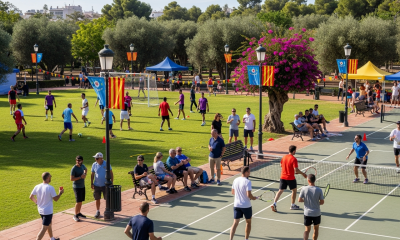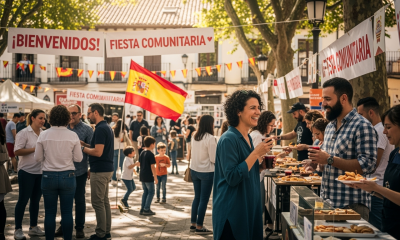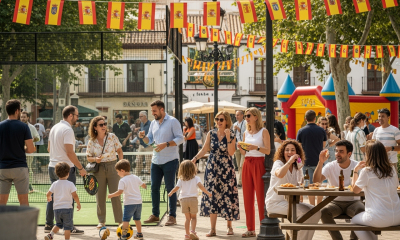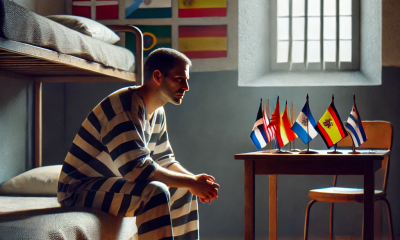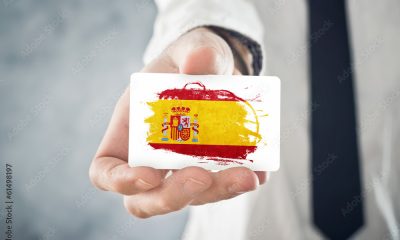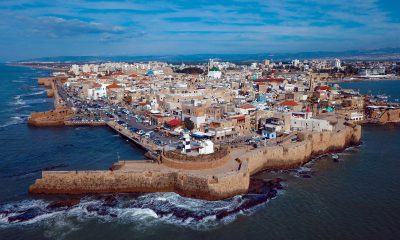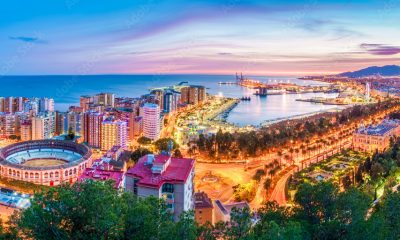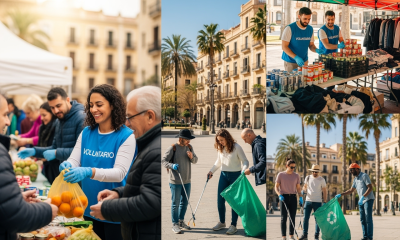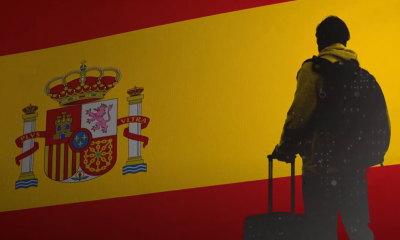Tourist Info
Torremolinos Long Nice Beaches
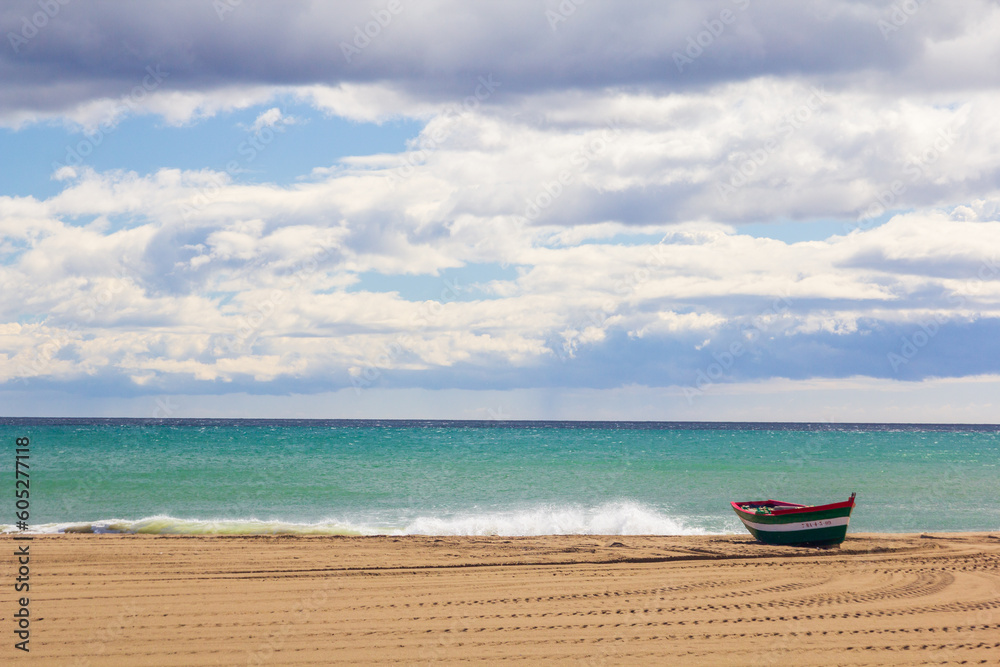
Torremolinos: The Heartbeat of the Costa del Sol
Located along the shimmering coastline of the Costa del Sol, just a short drive from Málaga, Torremolinos is a vibrant seaside town that perfectly blends sun-soaked beaches,
a lively nightlife, and rich cultural history.
Once a quaint fishing village, Torremolinos has transformed into a bustling tourist hotspot, attracting visitors from around the globe with its unique charm and dynamic offerings.
A Rich Historical Tapestry
Torremolinos’ evolution from a small fishing village to a major tourist destination began in the mid-20th century.
However, its history stretches back much further. The area was first inhabited by the Phoenicians and later by the Romans and Moors.
Evidence of its historical significance can still be seen in landmarks like the 14th-century Torre de Pimentel, a watchtower that gave the town its name.
This blend of ancient and modern history gives Torremolinos a unique cultural depth.
Sun, Sea, and Sand
One of Torremolinos’ biggest draws is its stunning coastline. The town boasts several beautiful beaches, each offering something special.
Playa La Carihuela, once a traditional fishing neighborhood, is now famous for its wide sandy expanse and vibrant promenade lined with restaurants and shops.
Playa El Bajondillo, closer to the town center, is perfect for families, with calm waters and plenty of amenities.
The beaches are not just about sunbathing. Water sports enthusiasts will find a plethora of activities, from jet skiing and windsurfing to paddleboarding and sailing.
The beach promenades, known as paseos marítimos, are ideal for leisurely strolls, cycling, or enjoying a meal with a sea view.
Gastronomic Delights
Torremolinos is a haven for food lovers, offering a rich culinary scene that celebrates both local and international flavors.
The town is famous for its chiringuitos (beach bars), where you can savor fresh seafood dishes like pescaíto frito (fried fish), grilled sardines (espetos), and paella,
all accompanied by the sound of waves lapping against the shore.
La Carihuela, in particular, is renowned for its seafood restaurants, while the town center offers a diverse range of dining options,
from traditional tapas bars to sophisticated international eateries.
Don’t forget to try local specialties like gazpacho and ajoblanco, a cold almond and garlic soup.
Nightlife and Entertainment
Torremolinos is synonymous with vibrant nightlife. The town offers a plethora of bars, clubs, and entertainment venues that come alive as the sun sets.
The famous street of Calle San Miguel transforms into a bustling hub of activity, with lively bars and nightclubs that cater to all tastes,
from flamenco and live music to dance clubs and cocktail bars.
The LGBTQ+ community will find Torremolinos particularly welcoming, with a vibrant gay scene centered around La Nogalera district.
This area hosts numerous gay bars, clubs, and events, making it a popular destination for LGBTQ+ travelers.
Cultural Attractions
Beyond the beaches and nightlife, Torremolinos boasts a range of cultural attractions.
The Casa de los Navajas, a beautifully restored palace, offers a glimpse into the opulent past with its Moorish-inspired architecture and stunning interiors.
The Molino de Inca Botanical Garden, with its lush landscapes and historical flour mill, provides a peaceful escape and a chance to explore local flora and fauna.
The town also celebrates various festivals throughout the year, such as the Carnival in February, the Romería de San Miguel in September, and the Día del Pescaito in June,
each offering a unique insight into the local traditions and community spirit.
Outdoor Adventures
For those seeking adventure beyond the beach, Torremolinos offers numerous outdoor activities.
The nearby Sierra de Mijas mountains provide excellent hiking and biking trails with breathtaking views of the coastline.
Golf enthusiasts will find several world-class golf courses in and around Torremolinos, making it a prime destination for golfing holidays.
Conclusion
Torremolinos is a multifaceted gem on the Costa del Sol, offering a perfect blend of relaxation, excitement, and cultural richness.
Whether you’re lounging on its pristine beaches, savoring its culinary delights, dancing the night away, or exploring its historical sites, Torremolinos promises an unforgettable experience.
It is a place where the warmth of the sun is matched by the warmth of the local hospitality, inviting you to return again and again.
Cultural
Best Spanish festivals and how expats can participate (2025 edition)

Published: August 2025
Spain is world-famous for its vibrant festivals – from wild street parties to solemn processions and everything in between. For expats, joining in these celebrations is one of the best ways to experience Spanish culture, meet locals, and make lifelong memories. Here’s your guide to the most popular Spanish festivals in 2025, plus tips on how foreigners can join the fun.
Why festivals matter in Spain
Festivals (fiestas) are at the heart of Spanish life. Each town, city, and region has its own unique celebrations, often rooted in history, religion, or local traditions. These events bring communities together, break down barriers, and create unforgettable experiences for everyone – locals and newcomers alike.
Top Spanish festivals in 2025
- La Feria de Abril (Seville): A week of flamenco, horses, and casetas. Join in by renting a traditional costume and dancing until dawn.
- San Fermín (Pamplona): Famous for the running of the bulls. Expats can watch safely from balconies or join the parades and concerts.
- La Tomatina (Buñol): The world’s biggest tomato fight! Tickets are required – book early for 2025.
- Las Fallas (Valencia): Giant sculptures, fireworks, and street parties. Volunteer to help build a falla or join a local group.
- Semana Santa (nationwide): Dramatic Easter processions in cities like Málaga, Seville, and Granada. Respectful participation is welcome.
- Feria de los Países (Fuengirola): Celebrate global cultures with food, music, and dance – perfect for expats!
- Fiesta de San Juan (coastal towns): Bonfires and beach parties on the shortest night of the year. Bring friends and jump the flames for luck.
How expats can join in
- Check your local town hall or tourist office for festival dates and activities.
- Look for expat groups or language exchanges organizing group visits.
- Volunteer for setup or events – many festivals welcome extra hands.
- Respect local customs and dress codes, especially for religious events.
- Bring cash, comfortable shoes, and a sense of adventure!
Useful links
FAQ
Disclaimer: This article is for informational purposes only. Always check official sources for dates and details before attending.
Cultural
International Feria Fuengirola 2024: a celebration of cultures and community

International Feria Fuengirola 2024: a celebration of cultures and community
Published: August 2025
Every spring, Fuengirola on the Costa del Sol transforms into one of Spain’s most vibrant showcases of international culture. The International Feria Fuengirola—also known as Feria de los Países—brings together more than 30 countries for five unforgettable days of music, food, dance, and friendship. In 2024, the fairground once again welcomed tens of thousands of visitors, expats and locals alike, for a true celebration of diversity, unity, and joy.
A festival for everyone
The Feria is much more than just an event—it’s a living symbol of how people from all over the world can come together in Spain and create something unique. With more than 30 national pavilions, you can stroll from Spanish flamenco to Argentinian tango, from Finnish sauna culture to Peruvian ceviche, all in a single afternoon. The atmosphere is pure happiness: families, friends, and strangers laughing, dancing, and sharing experiences with almost no trouble or conflict—just five fantastic days of community spirit.
Highlights from around the world
Each country’s stand is a mini-embassy of culture. Spain’s own pavilion is always a crowd-pleaser, with regional food, live flamenco, and artisan crafts. The Argentinian stand draws crowds for its sizzling steaks and passionate tango shows, while Chile’s booth offers pisco sours and lively cueca dancing. Germany’s beer garden is a social hub, with bratwurst and folk music, while the UK and Ireland stands serve up fish & chips, Guinness, and live rock bands. Peru’s pavilion is a must for foodies, with ceviche and pisco cocktails, and Finland surprises many with smoked salmon, reindeer snacks, and even a pop-up sauna.
Beyond food and drink, each stand hosts cultural performances—traditional dances, live concerts, costume parades, and workshops for kids and adults. It’s not just about watching; visitors are encouraged to join in, try a dance, sample a dish, or learn a few words in a new language.
Family-friendly fun
The Feria is designed for all ages. There are children’s workshops, face painting, international games, and plenty of open space to run and play. Many families make a day of it, sampling treats from different countries and enjoying the colorful parades that wind through the fairground each afternoon.
Peaceful, positive atmosphere
What makes the International Feria Fuengirola truly special is its peaceful, inclusive vibe. Despite the crowds and the many different languages and cultures represented, there’s virtually no trouble—just people enjoying life together. It’s a powerful example of how multicultural Spain really is, and how expats and locals can celebrate side by side.
Practical tips for visiting
- Dates: The 2024 edition ran from 1–5 May. The fair is held annually, usually around the same dates.
- Location: Fuengirola Fairground (official site), easily reached by train, bus, or car.
- Admission: Entry is free. Food, drinks, and some activities are paid per item.
- Opening hours: Stands typically open from midday to late evening.
- Family tips: Arrive early for easier parking and less crowded stands. Bring cash for food and souvenirs.
- Accessibility: The fairground is flat and accessible to wheelchairs and strollers.
- What to bring: Comfortable shoes, sunscreen, and an open mind!
Useful links
- Official Feria website
- Sur in English – Feria news
- YouTube: Feria de los Pueblos 2024 walking tour
- MamaMalaga – Feria review
Gallery: authentic moments from International Feria Fuengirola

FAQ: International Feria Fuengirola
When is the Feria held? Usually in early May. The 2024 edition ran from May 1–5. Check the official website for next year’s dates. Is the Feria suitable for children? Yes, there are activities, workshops, and plenty of space for families. How much does it cost to enter? Entry to the fairground is free. Food, drinks, and some activities are paid per item. Can I buy tickets in advance? No ticket needed for entry, but some shows or tastings may require advance booking. Are pets allowed? Pets are generally not allowed due to crowds and noise, but check official info for exceptions. How do I get there? The fairground is in central Fuengirola, close to the train station and with good parking options. Can I volunteer or participate as a performer? Contact the organizers via the official site for info on participation. Is the event accessible for people with disabilities? Yes, the fairground is flat and accessible for wheelchairs and strollers. Which countries are represented? Over 30 countries, including Spain, Argentina, Chile, Germany, UK, Ireland, Peru, Finland, and many more. Where can I find more photos and videos? Visit the official Feria gallery or search “Feria de los Países Fuengirola” on YouTube and Instagram.
Disclaimer: This article is for informational purposes only. All photos and screenshots are credited to their original creators. Please contact us if you would like your images featured or credited.
Cultural
Tap into community events and festivals: how expats can connect in Spain

Published: August 2025
Spain is world-famous for its lively community events and colorful festivals, which are at the heart of local culture. For expats, participating in these events is one of the best ways to meet people, learn about Spanish traditions, and feel truly at home. Whether you live in a big city or a small village, there’s always a fiesta, market, or neighborhood gathering to join. Here’s your guide to making the most of Spanish community life as a foreigner.
Why community events matter for expats
Community events are where Spanish hospitality shines. They bring together locals and newcomers, young and old, for shared experiences—food, music, dance, and celebration. For expats, joining these gatherings is a fast track to making friends, practicing Spanish, and discovering what makes each region unique.
Types of events you can join
- Local fiestas: Every town and city has its own annual festival, often featuring parades, concerts, fireworks, and traditional costumes. Check your town hall’s website for dates and details.
- Food and wine fairs: Spain’s regions celebrate their culinary heritage with markets, tastings, and cooking contests. Don’t miss the chance to try local specialties!
- Sports tournaments: From fun runs to football matches and cycling races, sports events are open to everyone—join as a participant or a fan.
- Music and dance festivals: Flamenco, jazz, classical, and pop—there’s something for every taste. Look for open-air concerts and dance workshops.
- Charity events and volunteering: Get involved in community projects, fundraisers, or environmental clean-ups. It’s a great way to give back and meet like-minded people.
How to find out about events
- Check your local town hall
- Follow local Facebook groups and WhatsApp chats
- Look for posters in shops, cafés, and community centers
Tips for joining in
- Don’t be shy—locals are usually happy to welcome newcomers, especially if you show interest in their traditions.
- Bring friends or go alone—either way, you’ll meet people.
- Try local food, join a dance, or volunteer for an activity to break the ice.
- Learn some basic Spanish phrases to help you join conversations.
- Always check if events are free or require tickets in advance.
Useful links
How can I find out about local festivals in my town? Check your town hall’s website, local Facebook groups, and posters in shops and cafés. Are community events open to foreigners? Yes, Spanish events are very inclusive—everyone is welcome! What should I bring to a local festival? Comfortable shoes, some cash, and an open mind—many events involve walking, dancing, and trying new foods. Do I need to speak Spanish to participate? Not necessarily, but learning a few phrases helps. Many locals are happy to help you practice. Are there family-friendly community events? Absolutely—most festivals and fairs have activities for children and families. How can I volunteer at community events? Contact the organizers via town hall, community centers, or event websites. Is it safe to attend large events? Yes, but as with any large gathering, keep an eye on your belongings and follow local advice. Can I join in traditional dances or processions? Yes! Locals love when newcomers join in—just follow the crowd and have fun. What’s the best way to meet people at events? Be open, start conversations, and don’t hesitate to join group activities. Where can I find more information about Spanish festivals? Spain.info and your local town hall are the best sources for up-to-date event info.
Disclaimer: This article is for informational purposes only. Always check official sources for event dates and details.









